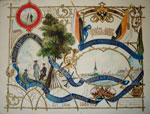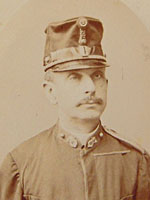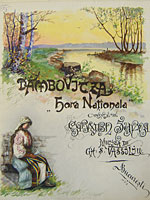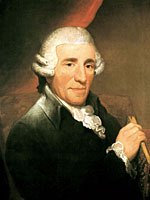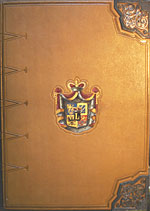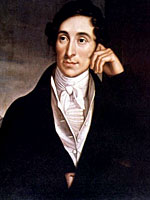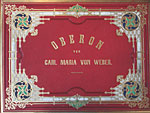Composers and Givers
The main givers of music manuscripts were, of course, musicians. Most often, these people were well known in Russia, especially in St. Petersburg and Moscow. Almost no one remembers their names now, but at that time they were considered the leading Russian musicians. To name just some of them: Nikolai Bahmetev, a violinist, choirmaster, composer, director of the Court Chapel, and Ivan Rybasov, a teacher of the St. Petersburg Conservatory and a conductor of the Drama Theatre named after Empress Alexandra Feodorovna. Bahmetev dedicated the hymn «Thee, O God, we praise» to Alexander II in memory of the most momentous deeds of the Emperor: his accession to the throne in 1855 and the abolition of serfdom in 1861. Ivan Rybasov, presented to Alexander II the «Inspirational Song for the Day of the Miraculous Rescue of the Russian Tsar», written on a failed attempt on the Emperor's life in St. Petersburg by Dmitry Karakozov in 1866.
As is known, in the 18th-19th centuries, many foreigners served in Russia as musicians. They also presented their compositions to the emperors. For instance, the German Karl Schuberth, appointed a soloist of his Majesty in 1835 after the first concert in St. Petersburg, lived and worked in Russia for 27 years. Не address to Emperor Nicholas I the cantata «Our People's Cry» and later wrote «The Funeral Elegy» on the death of the Empress Alexandra Feodorovna.
Felice Ronconi was an Italian bass-baritone and music teacher, who sang in Italian and Russian opera houses. Since 1858, he served in the St. Petersburg Theatre School and Teachers' Training Institute. In 1856, Ronconi dedicated the «Solemn Choir Celebrating the Coronation of the Emperor» to Alexander II. The German violinist, conductor and composer Ludwig Wilhelm Maurer, who held an important position of the supervisor in the St. Petersburg Imperial Theatres, presented «Solemn Polish [Polonaise]» to Alexander III. There are many other names of musicians whose works were dedicated to Emperors and are now kept in the National Library.
The authors of musical tributes to the Imperial family were often bandmasters of military troops. This is evidenced by records written in the manuscripts about current or former conductors who headed the military bands. The National Library of Russia houses music manuscripts of several military bandmasters. For instance, Adolph Bauer, a German-born Russian musician composed Festival Overture «Memories of Moscow» celebrating the coronation of Alexander II. The former bandmaster of the 11th East Siberian Rifle Regiment A. Krasner addressed the march «The 300th anniversary of the House of Romanov» to Nicholas II. The regimental bandmaster of the 89th White Sea Infantry Regiment Ivan Novak brought the «Welcom March» to the attention of Grand Duke Vladimir Alexandrovich and his wife Grand Duchess Maria Pavlovna. Jan Kváča,a Czech composer, former conductor of the 57th Modlin Infantry Regiment quartered in Odessa, sent the «Coronation March for Brass Band» to Nicholas II. Jan Kváča's photograph was enclosed together with the scores of the Coronation March in the folder sent from Prague. In the same folder, he put a letter addressed to Emperor Nicholas II. In the letter, the musician said that after serving in the Russian army, he returned to his homeland. Addressing to the Emperor, the Czech musician emphasized that he was closely connected with Russia, and asked to judge his music and to give an appraisal of his work. It is not clear whether Kváča got the answer, but the scores has passed through the hands of the emperor, as evidenced by the pencil record on the title page, 'Received from the Emperor on 14 April 1896.' In other words, the manuscript entered the Court Orchestra Library without any expert decision, bypassing the Office of the Ministry of the Imperial Court. Music manuscripts for royal persons were sent not only from the Czech Republic, but also from England, America, Romania, Bosnia and Herzegovina and other countries.As regards the autographs of great musicians, they tend to came to the emperors through third parties. The Manuscripts Department holds the autograph of Joseph Haydn's opera «The Unexpected Encounter». The opera was composed in 1775 for Prince Nikolaus Esterhazy musical theater in Eisenstadt in Hungary, in which Haydn ran the orchestra for about 30 years. The heirs of the Prince possessed this opera like some other autographs of Haydn.
The Manuscripts Department kept a letter from a descendant of Prince - Pal Antal Esterházy to A. Lvov, in which he proposed to select anything from the manuscript heritage of the great composer. From the letter, it is not clear what goal the Hungarian Prince had, consulting with Lvov. But it is quite possible that he asked advice on how to choose the right gift for the Russian Emperor. After sending a letter to Lvov, Pal Esterhazy was going to Russia where he was appointed an Austrian ambassador to attend the coronation of Alexander II in 1856. Ambassadors, as we know, did not visited such events without gifts. It is hard to imagine a gift better than Haydn's autograph. To decide which of the variety of manuscripts to give to the Emperor, he cosulted the person who played music in the the royal family circle for many years.
A. Lvov well knew their tastes and was the best advisor in this matter. He probably gave advice to the prince. As a result, the autograph of the opera, 'enlosed in the rich luxury box, decorated with a fine handmade silver ornamental design', as stated in the Report of the Imperial Public Library for 1858, was presented to the Emperor, and then was transferred to the Public Library.
Note that Alexander II did not keep precious musical tributes long. In honor of his accession to the throne on 19 February, 1855, he received an autograph of the fairy opera extravaganza «Oberon, or The Elf King's Oath» by Carl Maria von Weber as gift from the composer's son Max Maria von Weber. The manuscript as well as Haydn's autograph was presented in a special box looking like a book, covered in red morocco decorated with a gold embossed border, and also with both gold and blind embossed designs and coloured leather inlay. The inner side of the box lid is covered with moire silk, and a moire ribbon is attached to its bottom to take the scores out of the box.In the same year, Alexander II donated the score of the opera to the Imperial Public Library. It happened on 9 April - the same day when Weber completed his opera, only 29 years later. The score carries a note of the composer, 'Vollendet London d [en] 9 Aprill 1826. Vormittags? [vor] 12 Uhr. Und somit die ganze Oper Oberon. Maria Weber. Soli Deo gloria!!!' ('Completed in London on 9 April 1826 in the morning at a quarter to 12. And this is the whole opera Oberon. Maria Weber. Thank God!!!').
In addition, the score bears a number of records by which the composer marked the completion of the musical numbers. For exampler, he ended the Introduction of the Act One with the note, 'geendigt d [en] 11 September 1825 - Koselschen Garten. M. Weber'. ("Finished on 11 September 1825 - Cologne Gardens. M. Weber").The ensemble of the Elf King Oberon, Sir Huon of Bordeaux and his squire Sherasmin with chorus of fairies and elves (number 4 in the manuscript score) is followed by Weber's note, 'beendiget d [en] 11 November 1825. Dresden'. ('Completed on 11 November 1825 Dresden').
The finale of Act 1 is accompanied with a record, 'Den ersten Act beendiget Dresden d [en] 18 November 1825. M. Weber' ('The Act 1 is completed in Dresden, on 18 November 18 1825. M. Weber').
Aria of Fatima (number 15 in the score, Act 3), according to Weber's note, was «Beendiget London d [en] 29 Marz 1826" ('Completed in London on 29 March 1826').
After Cavatina of Reiza (number 19 in the score, Act 3), the composer states, 'geendiget London d [en] 26 Marz 1826' ('Finished in London on 26 March 1826').
Rondo of Huon (number 20 in the score, Act 3) is accompanied by the record, 'Geendet London d [en] 24 Marz 1826. Nachts 11 Uhr. M. Weber' ('Finished in London on 24 March 1826 at 11 o'clock at night. M. Weber').
The choir, ballet and Huon's solo (number 21 in the score, Act 3) ends with a note, 'beendiget Dresden d [en] 25 Januar 1826. M. Weber' ('Completed in Dresden, on 25 January 25 1826. M. Weber').
Thus, the manuscript gives an accurate information about the place and time of composing musical numbers in the opera. Act 1 was written in Dresden and its environs (Cologne Gardens) from September 11 to November 11, 1825. Number 21 (in the manuscript score) in Act 3 was also composed in Dresden on January 25 in the next, 1826, year. Others numbers of this act were produced in London from 24 to 29 March of the same year. The overture was written last. Weber marked its completion, indicating the date and time (on 9 April 1826, in the morning, quarter to 12 o'clock). This record evidences that the overture was completed three days before the performence that took place on 12 April 1826. That means that the opera as a whole was finished. At the end Weber gave praise to the Lord.
The presented score was exhibited for general public in the Manuscripts Department as a valuable, noteworthy item immediately after it had entered the Imperial Public Library.
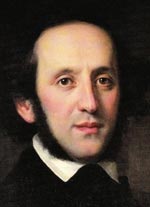
Mendelssohn-Bartholdy
Anton Christanell offered Mendelssohn to write a chorus with the words of Armenian Patriarch Hovhannes, said to Tsar Nicholas I during the ceremony of presentation him of a particle of the Holy Cross near Echmiadzin. These words reads, 'Let the victorious sign of the life-giving Cross continually protects you and your eminent descendants from enemies visible and invisible. Amen.'
Mendelssohn has slightly changed the sentence, replacing the words "your eminent descendants" with the phrase "your nearest and dearest". He forbade Christanell to publish the work. Therefore, even after the composer's death, none German publisher dared to publish it. And, since the words were addressed to Nicholas I, Christanell, under the pretence that the chorus was supposedly written in the Russian Emperor's honor, decided to ask him about its publication. As in the case of Haydn's opera, Alexei Lvov was invited as a mediator who introduced «Festival Song» to the Tsar, not to Nicholas I, who had died in 1855, but to his successor Alexander II, to whom the Armenian patriarch also addressed his words used in the text of the choir.
